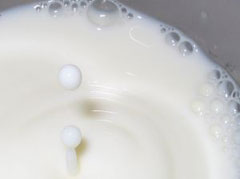Baltic, Foodstuff, Markets and Companies, Retail
International Internet Magazine. Baltic States news & analytics
Wednesday, 16.04.2025, 19:15
Milk prices rising 66% trigger Baltic price-fixing probes to ensure growth
 Print version
Print version |
|---|
"I certainly deplore situations where someone raises prices without a reason," Estonian President Toomas Hendrik Ilves told the country's food producers' lobby Sept. 29. "I urge the consumer protection and competition watchdogs to pay particular attention to what is happening to our prices."
Estonia said yesterday that September annual inflation was the fastest in 20 months at 4%. Lithuanian prices rose 0.6%, the biggest monthly jump since January, the statistics office said today. The small size of the Baltic markets and a drive to reduce regulation to boost living standards after communism has made them more vulnerable to global price increases than larger countries, economists say.
In Estonia, regulators are concerned that the country's plan to adopt the euro on Jan. 1 is giving companies an added excuse to raise prices., writes LETA/Bloomberg.
Estonian food prices rose 5.3% through August from their November lows, compared with the European Union average of 1.5%, according to data compiled by Bloomberg. Latvian prices have grown 3.2% and Lithuania's 1.6%.
Accelerating inflation may derail the region's economic recovery, said Violeta Klyviene, an analyst at Danske Bank A/S in Vilnius, Lithuania. In 2008, inflation accelerated to 10.6% in Estonia, 15.3% in Latvia and 11.1% in Lithuania, choking off domestic demand and contributing to the collapse of a property bubble.
"Global food price rises become a new risk factor for Baltic inflation," Klyviene said. "The Baltic economies tend to absorb price shocks to a much larger extent, pushing inflation higher, as the main players on the Baltic market are likely to abuse their dominant position domestically.”
Estonian prosecutors and competition authorities started an inquiry into dairy prices last month, after most leading retailers, including the Selver supermarket chain of AS Tallinna Kaubamaja, raised milk prices by 25% on Sept. 21. They launched a probe into a possible bread cartel in August, when the bread producers lobby announced plans to boost prices by 10% to 20%.
Lithuanian President Dalia Grybauskaite threatened this week to cap retailers' profits if returns from food prices continue to rise.
The Baltic states, which were part of the Soviet Union until 1991, may have waited too long to regulate market consolidation "as they believed too much in the market regulating itself" and rapid economic growth masked the issue, said Maris Lauri, chief economist at Swedbank AB in Tallinn, the Estonian capital.
"It is difficult to improve competition in small markets, and one should probably try to avoid different markets from concentrating too much," Lauri said. "Certainly in many cases this wake-up call comes too late. Another thing is careful supervision. Its importance has increased, not least by euro entry in Estonia's case."
Estonia has "few tools" to control price increases, Prime Minister Andrus Ansip said last month, after European Central Bank President Jean-Claude Trichet said Estonia must remain "alert" on price developments and take "forceful" action on inflation after joining the euro-region economy.
Prices for milk rose 41% in the 12 months through early September, according to the Konjunktuuriinstituut research institute. That was before the 25% increase. Vegetable prices increased by between 11% and 107%. Pork, poultry and bread prices declined, the institute said.
Competition among Lithuania's four biggest retail chains –- Maxima, Rimi, Iki and Norfa –- is "in theory, but not in practice," lawmaker Valentinas Mazuronis said this week on the TV show Lietuvos Rytas. Mazuronis' Law & Order party has proposed capping profit on food products at 20% for wholesalers and 25% for retailers.
Lithuania's Competition Council is examining trends in food prices to determine if retailers had confidential price agreements.
"Growing profits of retail chains on fundamental food products are an audacious exploitation of consumers," Lithuanian President Dalia Grybauskaite said in a statement Oct. 5. "Such actions by retail chains are intolerable and unjustifiable."








 «The Baltic Course» Is Sold and Stays in Business!
«The Baltic Course» Is Sold and Stays in Business!

